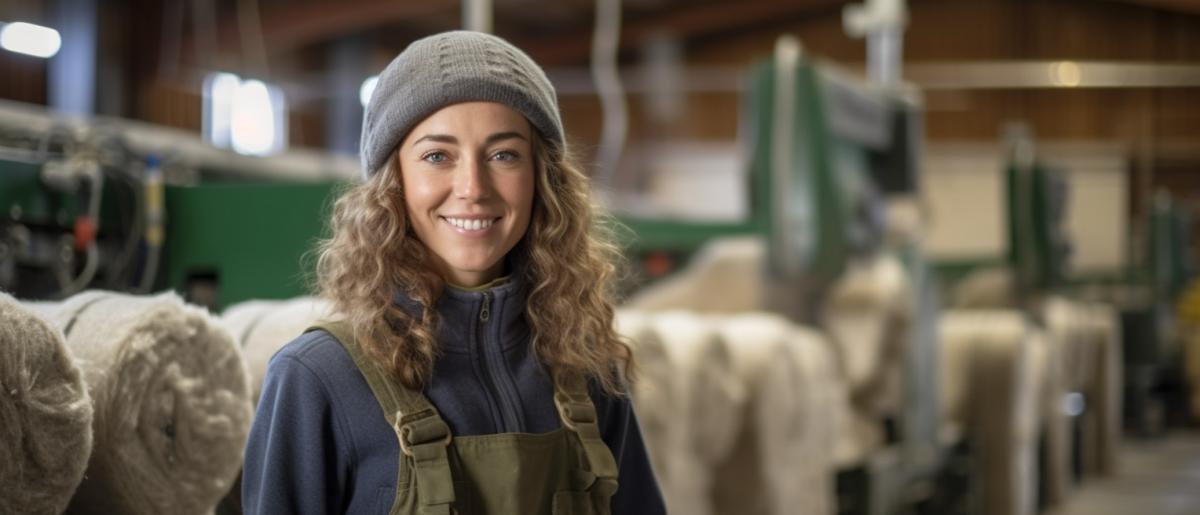

Navigating the ever-evolving world of wool processing requires agility and investment. For Australian enterprises focused on wool processing, business loans can offer a pivotal lifeline, fulfiling essential operational needs and fostering growth. The wool industry, a critical aspect of Australia's agricultural landscape, is laden with potential, making the ability to capitalise on opportunities crucial for wool processors. Financial backing enables these businesses to remain cutting-edge, modernising equipment, and streamlining procedures to stay competitive. It's not just about survival; it's about excelling, innovating, and shaping the future of the wool industry. Business loans are a potential game-changer, ready to propel wool processors forward when they need it most. Through strategic investment, bolstered by financial support, wool processors can accelerate progress, breaking down barriers to success. Whether it's boosting production capacity, enhancing wool quality, or investing in advanced technology, the right support can make a world of difference. It's a continuous journey, and business loans can play an integral role in navigating it. Embracing this approach, wool processors can ensure they're perfectly placed to thrive in Australia's wool industry, both now and into the future.
Compare over 40+ lenders with one application.
Wool processing is a key industry in Australia, driving growth and contributing significantly to the national economy. The country is amongst the world's largest wool producers, making wool processors an integral part of the Australian agricultural sector. Without Wool Processors, raw wool would remain simply that - raw, unrefined, and far from the quality, high-value product it has the potential to become. The role of Wool Processors is to transform this raw fibre into a variety of products, from clothing textiles to carpets, felts, and insulation materials. This transformation process involves stages such as scouring, carding, spinning and weaving. In addition to directly contributing to the economy, Wool Processors indirectly generate opportunities for related industries, including transport, retail, and logistics. Their activities further stimulate job creation and support sustainable rural communities. In environmental terms, Wool Processors help ensure that wool, a renewable resource, continues to contribute to Australia's low-carbon economy. It's worth noting that the processing of wool involves less energy consumption and lower carbon emissions than most synthetic fibres. The importance of Wool Processors extends beyond just economics and environmental contributions. The industry has a rich tradition in Australia, intertwining with our national historey and identity. It helps sustain the cultural fabric, from providing raw material for indigenous art forms to supporting major events like The Australian Sheep and Wool Show. In summation, the importance of Wool Processors in Australia is fundamental to the nation's economic strength, environmental sustainability, and cultural richness. Their pivotal role truly highlights the phrase, 'from bale to retail'.
Learn about eligibility and how to apply.
As a vital cog in the Australian wool industry, wool processors are no strangers to challenges that can hamper their growth and profitability. A primary hurdle experienced by these businesses is the volatility of wool prices. Astonishing fluctuations in the market can create uncertainty, making it tough for processors to make long-term investments and lock in contracts. High operational costs form another significant barrier. This includes not only the expense of purchasing raw wool, but also the costs associated with its handling, storage, and processing. Moreover, keeping up with advancements in technology and machinery for processing wool can be financially draining. The need to stay competitive in a global market further compounds this challenge. Australian wool processors also struggle with climatic changes that affect wool production. Droughts are particularly damaging, leading to decreased wool quality and supply issues, which in turn, can upend processors' business plans and affect market stability. Additionally, navigating Australia’s complex regulatory environment surrounding wool processing can be difficult for many businesses. The regulations, although necessary for maintaining sustainable and ethical practises, can sometimes place excessive burdens on businesses. In an increasingly interconnected world, global economic conditions can also greatly affect these businesses. International events such as trade disputes or economic downturns in countries that import Australian wool can significantly dampen demand and revenue. Overall, these challenges paint a picture of a dynamic, often testing, business environment for wool processors. It brilliantly underscores how essential it is for these businesses to have financial flexibility and resources, such as business loans, to navigate such hurdles.
Calculate your repayment estimates and more.
Investments in the wool processing industry often bear a significant financial burden. This is where business loans come into play, serving as a saving grace for wool processors in Australia. A business loan provides the capital necessary for enhancing business operations, stocking up on raw materials, or even expanding the business itself. This flexibility allows wool processors to address their business needs straight away, instead of waiting for enough capital accumulation, or risking a decrease in operational efficiency due to resource constraints. While material investments are an evident advantage offered by a business loan, the benefits go beyond merely monetary aspects. Expanding business conditions, thus, become more manageable, giving companies a competitive edge in the market. For instance, loans can be used to invest in new machinery or technology that may increase production speed, improve product quality, or reduce wastage. This can strengthen the position of wool processors in the market by enabling them to meet high demand or adapt to changes promptly. Interestingly, taking a business loan can also have a positive impact on a company's credit historey. When a business consistently meets its loan repayment schedules, it contributes to building a positive credit historey. This makes it easier to acquire additional credit in the future, should the need arise. Thus, taking a business loan does not only provide immediate relief and opportunities for growth but can also pave the way for future financial security. This way, wool processors can continue driving the backbone of Australia’s economy with peace of mind knowing financial support is within reach should hurdles come their way.
A range of business loan options are available to Australian Wool Processors. Options include unsecured business loans, lacking a requirement for collateral, business line of credit providing flexible access to funds, and equipment finance for machinery upgrades. Each loan type caters to unique needs within the wool processing industry.
There are several types of business loans in Australia that can benefit Wool Processors. Each of these loan types has its unique features, advantages, and potential disadvantages. Here are some of the most common types of business loans for Wool Processors:
Term Loans
Term loans offer a set amount of capital that Wool Processors can use for any business-related expenses. They are paid back over a specified period with interest.
Equipment Loans
These are specifically designed for purchasing equipment. If you're a wool processor needing to upgrade your machinery, an equipment loan could be a great option.
Line of Credit
Lines of Credit provide flexibility to business owners by giving them access to a set amount of funds that they can draw from as needed. It's an ideal choice for handling unexpected expenses or cash flow issues.
Overdraft Services
Similar to Lines of Credit, overdraft services offer Wool Processors the opportunity to draw funds beyond their account limit to manage cash flow. The interest is typically charged on the overdrawn amount.
Merchant Cash Advance
This option allows Wool Processors to borrow against their future earnings. The lender gives a sum of money upfront, which is then paid back by a percentage of the business's daily credit card sales.
Invoice Financing
For Wool Processors with outstanding invoices, invoice financing can unlock immediate funds. This is an excellent option for managing short-term cash flow issues.
Commercial Property Loans
Wool Processors looking to own their processing facilities might look into commercial property loans. These loans aid in the purchase or refurbishment of commercial properties.
Unsecured Business Loans
Unsecured loans present an attractive option for businesses who prefer not to offer any assets as collateral. These loans typically have a shorter repayment period due to the higher risk to the lender.
Asset Financing
Asset financing allows Wool Processors to leverage their existing assets to secure funding. These assets might include machinery, equipment, or even property.
Trade Finance
Tailored for businesses involved in international trade, Trade Finance can help Wool Processors manage risks associated with global commerce, ensure steady cash flow, and handle currency fluctuations.
Business loans can offer a lifeline for Wool Processors, enabling increased wool production through the acquisition of advanced processing equipment. They can support expansion into new markets and ensure smooth operational cash flow during the wool off-season. Such loans provide the financial flexibility that Wool Processors need to grow and thrive in the competitive Australian market.
Here are some common reasons Wool Processors use business loans:
Wool Scouring and Carbonising
A business loan can invest in high-end machinery for wool scouring and carbonising to ensure clean and dust-free wool for further processing.
Maintaining Wool Quality
Business loans help wool processors to invest in advanced technologies specifically designed to maintain the quality of wool during the process.
Expand Production Facility
Wool processors often use business loans to expand their production facility, meeting increased demand and creating jobs within the industry.
Market Research
An essential way for wool processors to stay competitive is by using business loans for comprehensive market research and customer analysis.
Purchase of Raw Material
With the help of a business loan, wool processors can buy raw material in bulk during the off-season when prices are typically lower.
Training Programs
Business loans can fund training programmes for employees, promoting best practises, safety measures and efficient wool processing techniques.
Equipment Upgrades
Regular equipment upgrades are essential to ensure efficient wool processing and improving product quality; a business loan can make it feasible.
Shipping and Delivery
Wool processors can use a business loan to expand their distribution network and improve the efficiency of their shipping and delivery services.
Inventory Management
Implementing sophisticated inventory management systems can streamline operations, and a business loan can provide the necessary funds for this.
Advertising and Marketing
Business loans can be utilised to boost brand recognition and exposure in the market through enhanced advertising and marketing efforts.
To estimate your monthly repayments and the total cost of the loan, input the loan amount, loan term and interest rate into the calculator below. This helps you plan your budget and choose the most suitable loan terms.
These helpful FAQs will help you find the answers you need. If you can't find what you're looking for, you can request a callback below.